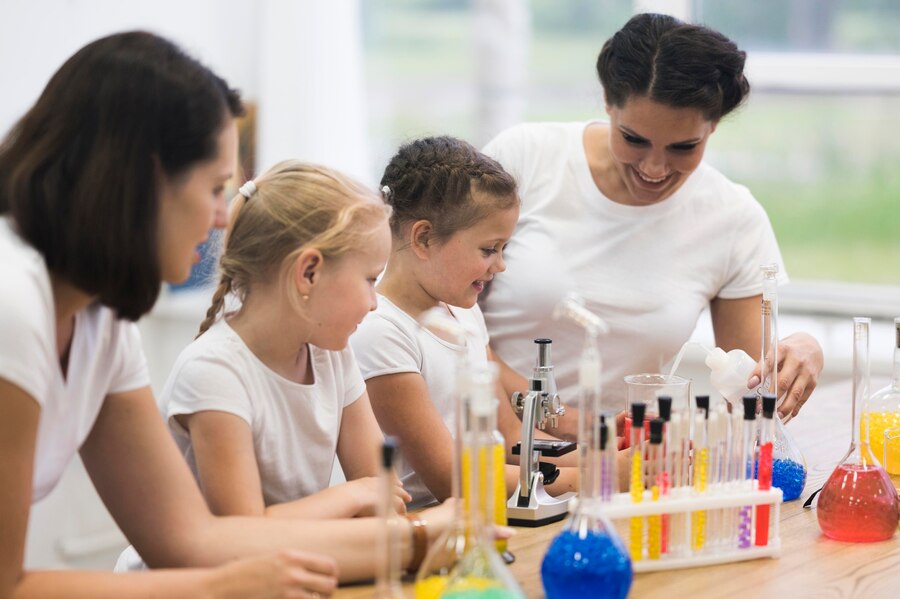Ignite Your Students’ Passion For Science With These Engaging Competition Ideas

Science is all about curiosity, discovery, and innovation. However, getting students truly excited about science can sometimes be a tough nut to crack.
A great way to spark their interest is by diving into competitions that bring out a sense of excitement and friendly rivalry.
Let’s dive into some science competition ideas that can fire up your students’ enthusiasm and help them get a deeper grasp of science.
The Benefits of Science Competitions
Before diving into specific competition ideas, it’s essential to understand the manifold benefits of science competitions for school students. These include:
- Enhanced Learning: Competitions propel students beyond standard curricula, delving deeper into scientific concepts. This deep dive enhances subject comprehension and boosts information retention.
- Teamwork and Collaboration: Competitions often necessitate teamwork, imparting essential collaboration skills. This not only strengthens student bonds but also primes students for future collaborative endeavours.
- Critical Thinking and Problem-Solving: Competitions present complex challenges that require critical thinking and problem-solving, skills that are invaluable across all disciplines. This environment champions innovation and creative solutions.
- Confidence and Motivation: Achievements in competitions elevate confidence and bolster motivation towards science pursuits. This positive feedback loop encourages students to embrace more challenging tasks with greater zeal.
Different Ways to Organise Science Competition

Creating a science competition that engages students effectively can be a task in itself.
In this section, we will explore various strategies to structure science competitions that can enhance participants’ creativity, engagement, and learning outcomes.
Idea 1: Science Fair Extravaganza
Science fairs, a timeless and effective contest, enable students to delve into and present a subject they’re passionate about.
It’s vital to motivate them to choose projects that spark their interest, from constructing a solar system model to conducting chemical experiments or exploring environmental shifts.
Tips for a Successful Science Fair:
- Provide Guidance: Offer resources and mentorship to help students choose and develop their projects. This could include a list of potential ideas, links to scientific research, or access to teachers for questions.
- Foster Creativity: Encourage innovative thinking and unique approaches to scientific questions.
- Include All Grades: Make the science fair accessible to students of all ages, allowing for age-appropriate challenges and categories.
Idea 2: Robotics Challenge
Robotics contests are a fantastic mix of engineering, computer science, and hands-on fun.
Pupils get to design, build, and code robots to tackle tasks or face off in competitions.
Top Tips for a Brilliant Robotics Challenge:
- Use Kits: Hand out robotics kits with all the bits and bobs plus instructions, so even beginners can join in.
- Clear Goals: Spell out what the robots need to do, like finding their way through a maze or pulling off a series of tasks.
- Team Spirit: Get students to team up, boosting cooperation and idea sharing.
Idea 3: Environmental Science Contest
As awareness of environmental challenges grows, an environmental science competition can be pertinent and captivating.
Students could explore local environmental issues, suggest solutions, or undertake experiments related to sustainability.
Guidelines for a Successful Environmental Science Competition:
- Emphasise Local Concerns: Motivate students to investigate and tackle environmental problems within their community.
- Enable Field Research: Permit students to conduct fieldwork, gather data, and analyse their results.
- Promote Awareness: Utilise the competition to educate students on the significance of environmental stewardship and sustainability.
Idea 4: Science Quiz Bowl
A science quiz bowl offers a thrilling platform for students to showcase their knowledge in various scientific fields. It involves team competitions where questions on biology, chemistry, physics, and astronomy are posed.
Strategies for an Effective Science Quiz Bowl:
- Create a diverse question bank that spans different subjects and challenges.
- Engage science educators as quizmasters and adjudicators to maintain question integrity and impartiality.
- Acknowledge every participant’s effort with certificates or tokens to foster a sustained enthusiasm for science.
Idea 5: Innovation Challenge
Inspire students to adopt an inventor’s mindset through an innovation challenge. They can pinpoint a real-world issue and craft a scientific solution or invention.
Keys to a Winning Innovation Challenge:
- Establish Clear Rules: Create definite criteria centred on creativity, practicality, and scientific principles.
- Supply Resources: Give students access to materials, tools, and guidance for their projects.
- Highlight Creations: Host an event for students to display their inventions to the school and wider community.
Idea 6: Bio-Inspired Design Contest
In this competition, students are tasked with creating designs or models inspired by nature. This could involve drawing inspiration from plant structures, animal adaptations, or natural phenomena.
Tips for a Successful Bio-Inspired Design Contest:
- Inspire Exploration: Encourage students to research and understand various biological systems.
- Resource Provision: Give access to materials and resources to help students develop their designs.
- Judging Parameters: Judge designs based on creativity, scientific understanding, and relevance to the chosen inspiration.
Idea 7: Coding and Data Science Competition
A coding and data science contest boosts analytical and problem-solving abilities in students. They can tackle tasks like crafting algorithms, data analysis, or app development.
Keys to a Winning Coding and Data Science Contest:
- Basics First: Cover fundamental coding principles and offer self-study resources.
- Practical Challenges: Use real-life issues as case studies for applying data science.
- Supply Kits: Distribute kits containing essential software and, if needed, hardware.
Idea 8: Science-Based Debate Tournament
Organising a debate tournament on scientific subjects can enhance critical thinking, research abilities, and communication skills.
Potential topics might cover ethical issues in science, debates on climate change, or the latest technological breakthroughs.
How to Host a Successful Science Debate Tournament:
- Provide clear research and argument presentation guidelines.
- Teachers should serve as moderators and judges to maintain a fair and orderly debate.
- Include everyone, allowing all students to engage, whether as debaters or audience members.
Idea 9: Astronomy Night
An astronomy night can spark student interest in space and the universe. Activities could include telescope observation, planetarium visits, or DIY rocket launches.
Tips for a Successful Astronomy Night:
- Preparation: Arrange telescopes, guidebooks and other necessary equipment.
- Educational Aspect: Ensure an educational aspect by including information on different celestial bodies.
- Involvement: Allow students to experiment hands-on with the equipment.
Idea 10: Health and Fitness Science Event
This contest could see students engage in experiments or projects linked to human health and fitness, such as exploring diverse diets, devising fitness regimens, or examining the effects of different activities on the human body.
Keys to a Winning Health and Fitness Science Event:
- Prioritise Health and Safety: Emphasise the significance of health and safety in all physical endeavours.
- Seek Expert Advice: Include professionals like gym instructors or dietitians to provide guidance.
- Focus on Practical Use: Promote projects with tangible, real-world applications.
In Summary
Incorporate engaging competitions into your school’s science programme to spark students’ passion for science. Competitions make learning dynamic and fun, preparing students with vital future career skills.
From science fairs to robotics and innovation challenges, there are many ways to inspire future scientists.
Read Also:

























